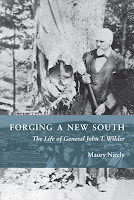New Arrival:
• Forging a New South: The Life of General John T. Wilder by Maury Nicely (UT Press, 2023).
Here we have yet another example of that odd, yet welcome, Civil War publishing phenomenon in which a previously neglected subject is suddenly treated to a pair of full-length studies released in close succession. Back in January, Mercer UP published Steven Cox's John T. Wilder: Union General, Southern Industrialist, and only three months later University of Tennessee Press released Forging a New South: The Life of General John T. Wilder by Maury Nicely. As one can readily see from the titles, the books share common themes from the general's life in and out of uniform.
Some differences between the two studies are readily apparent. Nicely's biography is roughly twice the page length of Cox's, and the chapters covering Wilder's Civil War activities in Forging a New South are nearly the same length as Cox's entire narrative. Nicely's prodigious body of research also dwarfs that of its compatriot, with the newspaper section alone larger in size than the entire bibliography of many Civil War books.
The study is presented in two evenly divided parts, the first covering Wilder's early life and Civil War career and the second addressing his great multitude of business and political activities in the postwar South. Given that only a half-dozen of the book's 400-plus pages of narrative are devoted to Wilder's life before the outbreak of secession and Civil War, one might surmise that the source material for that period is relatively scant (or perhaps that material was trimmed for length). Of course, Wilder is best known today for his innovative leadership of the celebrated "Lightning Brigade" of mounted infantry, and the bulk of Part 1 is concerned with documenting the entirety of Wilder's Civil War military career, which had its ups and downs. The lowest point was the surrender at Munfordville, Kentucky in 1862, but that career embarrassment was erased the following year by his inspired handling of the Lightning Brigade during the Tullahoma and Chickamauga campaigns. Unfortunately, Wilder was plagued by poor health throughout much of his service and was finally forced in resign in late 1864.
However, those repeated bouts of wartime sickness did not preclude Wilder from living a long and eventful life before passing away at the age of 87. Half the book covers a highly productive post-bellum life that Nicely assesses as having "left a permanent mark on the industrial development of the war-torn South in the second half of the nineteenth century." From the description: "A successful entrepreneur and industrialist, after the war Wilder relocated to East Tennessee, where he created dozens of businesses, factories, mines, hotels, and towns; was elected mayor of the city he had shelled during the war; and cultivated close personal and business relationships with Federal and Confederate veterans alike, helping to create a new South in the wake of a devastating conflict."



I started reading my copy a few days ago. In just a few pages, I learned more about Wilder's character than I did from the entire Cox bio. Topnotch so far.
ReplyDelete